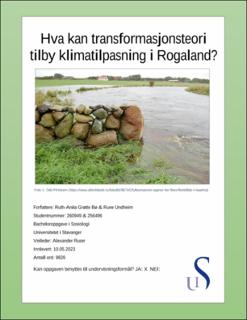| dc.contributor.advisor | Ruser, Alexander | |
| dc.contributor.author | Undheim, Rune | |
| dc.contributor.author | Bø, Ruth-Anita Grøtte | |
| dc.date.accessioned | 2023-06-30T15:51:37Z | |
| dc.date.available | 2023-06-30T15:51:37Z | |
| dc.date.issued | 2023 | |
| dc.identifier | no.uis:inspera:147650656:65127072 | |
| dc.identifier.uri | https://hdl.handle.net/11250/3074769 | |
| dc.description.abstract | Noen danser regndans, noen ber til høyere makter for å få det været de ønsker, mens andre iverksetter avanserte og nøye planlagte tilpasningsstrategier. Verden har blitt mindre og vi står alle sammen overfor globale konsekvenser etter årevis med økt industriell produksjon. Hvordan disse klimatiske endringene påvirker ulike folkeslag og samfunn, varierer i stor grad, men vi kommer alle til å merke endringer i større eller mindre grad. Siden endringene som skjer ikke kan løses med én spesifikk plan, som passer alle verdens samfunn, så må hver enkelt region ha en spesifikk plan som tar høyde for lokale forhold. Denne studien tar for seg Rogaland fylkeskommunen sin plan for klimatilpasning og bruker Karen O’Briens perspektiver på transformasjon, og transformasjonsteorien til å se på svakheter og styrker til klimatilpasningsplanen. Vi har foretatt en dokumentanalyse hvor vi har brukt to dokumenter som fylkeskommunen har publisert, og som angår deres planer til klimatilpasning. Transformasjonsteorien vil være denne oppgavens hovedteori, men vi bruker også Ulrich Becks teori om risikosamfunnet som grunnmur i vår forståelse av klimarisiko, risikopersepsjon og behovet for adaptasjon. Oppgavens hovedpoeng er – som tittelen sier, om transformasjonsteorien har noe å bidra med i klimatilpasningsplanen til Rogaland fylkeskommune. Vi konkluderer med at transformasjonsteorien har noen punkter hvor den kan bidra i Rogalands klimatilpasningsplan, og spesielt på det teorien kaller for den personlige sfæren. | |
| dc.description.abstract | Some participate in rain dance, some pray to higher powers for better weather, but others implement advanced and carefully planned adaptive strategies. The world has become smaller, and we are all facing the same global consequences after years of high industrial production. How these climatic changes affect different peoples and societies, will vary in a high degree, but we will all notice bigger or smaller changes in some sence. Since these changes that are happening cannot be satisfied with one specific plan that fits all the societies of the world, every specific region must have a plan that are adapted to local changes. This study takes Rogaland fylkeskommune plan for climate adaptation and compare this with Karen O'Briens theory of transformation. We also use this theory to show weaknesses and strongpoints with the climate adaption plan. We have partaken in a document analysis where we have used two documents that fylkeskommunen have published that shows what their plans and measures are and how they are to be put in play. Transformational theory will be the main theory of this study, but we are also using Ulrich Becks theory of risk society as a foundation in our understanding of climate risk, risk perception and the need of adaption. The main point of this study – as the title is telling, if transformational theory has anything to contribute with in Rogalands plan for climate adaption. We conclude that the plans have a lot of work needed on what the theory is calling its personal sphere of adaption. | |
| dc.language | nob | |
| dc.publisher | uis | |
| dc.title | Hva kan transformasjonsteori tilby klimatilpasning i Rogaland? | |
| dc.type | Bachelor thesis | |
